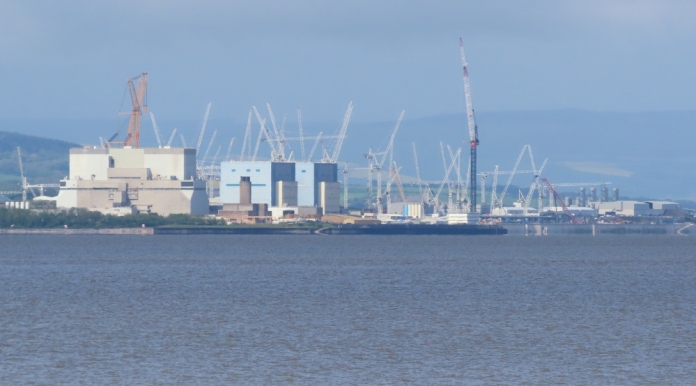A ‘Meet the Regulator’ event will take place today (Tuesday 16th July) hosted by the Environment Agency team responsible for working with EDF on the environmental conditions which EDF are required to fulfil at Hinkley Point C.
Taking place at Bridgwater and Albion Rugby Football Club in Bridgwater between 10am-1pm, the drop-in session will be overseen by the EA.
It comes as locals have spoken out over EDF’s plans to create a huge new saltmarsh on the Pawlett Hams instead of introducing measures to prevent fish being killed at Hinkley Point C.
Hinkley Point C says the new saltmarsh on the Pawlett Hams would be a ‘natural alternative’ to installing an acoustic fish deterrent at the new power station.
As Burnham-On-Sea.com reported here, EDF is planning to create a saltmarsh at Pawlett Hams to create a new habitat for fish and animals instead of creating an acoustic fish deterrent system at Hinkley Point C which would stop millions of fish from swimming into the plant’s cooling system and being killed.
Local environmental campaign group Protect Pawlett Hams Action Group claims the EDF plans are an “ecological disaster in the making.”
And Fish Guidance Systems (FGS) is calling for urgent support from the Environment Agency (EA) on how a Acoustic Fish Deterrent (AFD) system will be included in EDF Energy’s plans at Hinkley Point C.
FGS says: “One of these conditions includes the application of an AFD which uses low-frequency signals to deter fish from the cooling intakes for the nuclear power plant, located two miles offshore.”
“This would save the lives of local and protected fish species in the Severn Estuary, which would otherwise be pulled through the cooling water systems and released back into the Estuary. Fish under threat include shad, while migratory species such as Atlantic salmon and shad will have a 50% and 100% respective death rate if pulled into the processing as reported in a Welsh Government Commission.”
“FGS is aware of the limitations faced by the EA, as any decision on changes to the DCO currently sits with the Department for Energy Security and Net Zero (DESNZ), however, FGS welcomes the opportunity to discuss how the EA will take a proactive approach to encourage EDF to install the AFD and prioritise the preservation of aquatic ecosystems.”
“FGS is also looking forward to hearing the latest update from the EA on how they are responding to the overwhelming negative response to the saltmarsh plans; EDF’s suggested compensation for the potential removal of the AFD system.”
EDF has suggested the creation of wetland habitat for birds and other species, combined with enhancements to fish passage on a small number of existing weirs however, several environmental groups state that this will not compensate for the millions of fish pulled in by the intakes every year, which some estimate to be 128 million. FGS urges that an AFD system is the only warranted option.
Dr David Lambert, Managing Director of Fish Guidance Systems, adds: “Acoustic Fish Deterrent systems have been successfully used at coastal power plants for nearly thirty years and EDF’s repeated appeal to the government to revoke the use of one does not take into account the important fish species and wider ecosystem. We want to use our expertise to help EDF make informed, scientifically-backed decisions. Now that EDF it is stating it wishes to make a “Material Change Application” to the Development Consent Order, we look forward to meeting in person with the Environment Agency to garner updates on the situation, learn how the regulator will take a proactive approach in encouraging EDF to install the AFD, and work together with key stakeholders to change the fate of all the species at risk.”
In the consultation overview document, NNB Generation Company (HPC), the EDF subsidiary set up to build and operate Hinkley Point C, says there are no examples of acoustic fish deterrent systems being installed permanently in the “harsh conditions” found in this part of the Bristol Channel. It adds at the time of the original application, AFD systems were regarded as “emerging best practice” but it had now decided that having to use divers made it an “intolerable and unjustifiable” risk.
Chris Fayers, Head of Environment at Hinkley Point C, claims: “The new wetland would







